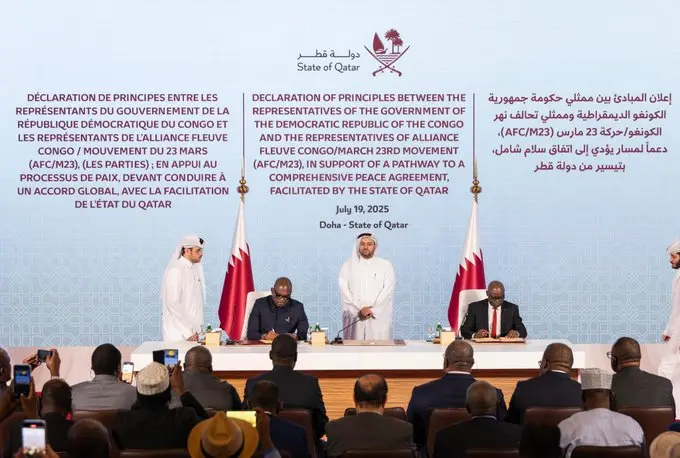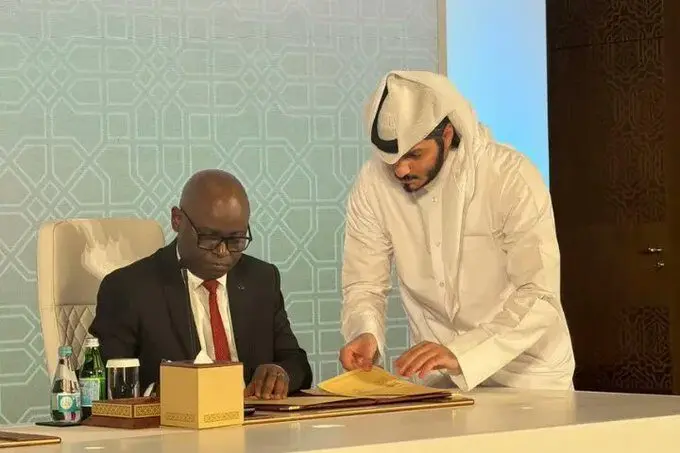Critical 2025 Update: DRC M23 Qatar Peace Declaration Signed Amid Disputes Over Territorial Control

DRC M23 Qatar peace declaration 19/7/2025
July 19, 2025 Hour: 2:16 pm
DRC M23 Qatar Peace Declaration: A historic agreement brokered by Qatar aims to end hostilities, but disputes over troop withdrawal cast doubt on its implementation. What does this mean for the conflict in eastern DRC.
Related: DRC Army Condemns Renewed Attacks by M23, AFC, and Rwandan Forces Amid Fragile Peace
Geopolitical Context Behind the DRC M23 Qatar Peace Declaration
The DRC M23 Qatar peace declaration marks a pivotal moment in the long-standing conflict that has ravaged eastern Democratic Republic of the Congo for over a decade. On Saturday, July 13, 2024, the Congolese government and the M23 armed group signed a declaration of principles in Doha, Qatar, laying the foundation for a broader peace agreement aimed at ending the violence that has claimed thousands of civilian lives and displaced millions.
Despite the formal agreement, immediate disputes emerged over key clauses — particularly the question of whether M23 will withdraw from occupied territories. The declaration, backed by Qatari mediation, includes commitments to a permanent ceasefire, an end to hate propaganda, and the restoration of state authority in the east. However, the lack of clarity on M23’s military presence has raised concerns about the declaration’s enforceability.
DRC and M23 Sign Qatar-Brokered Declaration
In a significant diplomatic move, the Democratic Republic of the Congo (DRC) and the March 23 Movement (M23) signed a declaration of principles in Doha, Qatar, intended to pave the way for a comprehensive peace agreement. The document was signed by Sumbu Sita Mambu, special envoy of President Félix Tshisekedi, and Benjamin Mbonimpa, a senior M23 representative.
The declaration includes provisions for:
- A permanent ceasefire
- An immediate end to hate speech
- A prohibition on further territorial advances
- A roadmap for restoring state authority in eastern DRC
Despite the optimism surrounding the signing, disagreements surfaced within hours, particularly regarding the M23’s refusal to withdraw from occupied zones, a demand that Kinshasa considers non-negotiable.
🔗 Reuters – DRC M23 Peace Talks
Immediate Disputes Over M23’s Territorial Presence
While the DRC M23 Qatar peace declaration was hailed as a breakthrough, the two parties quickly diverged in their interpretation of its terms. Patrick Muyaya, spokesperson for the Congolese government, insisted the agreement includes a “non-negotiable withdrawal” of M23 forces from occupied territories.
However, Benjamin Mbonimpa, M23’s permanent secretary, denied such a provision in a video posted on X (formerly Twitter), stating: “The declaration does not mention any withdrawal. M23 will not retreat one meter. We remain where we are.”
This contradiction has raised doubts about the viability and enforceability of the agreement, especially as both sides claim to have upheld their red lines.
M23 Denies Withdrawal Obligations
M23’s stance was further reinforced by Lawrence Kanyuka, the group’s official spokesperson, who accused Kinshasa of violating the spirit of the agreement by interpreting the clause on restoring state authority as a demand for M23’s retreat.
“The declaration does not require our withdrawal — that will not happen. We remain in liberated zones,” Kanyuka stated.
Mbonimpa added that the issue of territorial control will be addressed during future negotiations — set to begin by August 8 and conclude with a final agreement by August 18.
This delay in resolving the core dispute has led many analysts to believe that the declaration is more procedural than transformative, and that the real test lies ahead.

Broader Regional Implications of the DRC M23 Peace Process
The DRC M23 Qatar peace declaration is part of a broader diplomatic effort to stabilize the Great Lakes region, long plagued by ethnic tensions, militia warfare, and foreign interference. The African Union (AU) welcomed the agreement as a “significant step toward lasting peace,” while UN peacekeepers in the region (MONUSCO) have been tasked with monitoring compliance with the ceasefire.
However, the situation remains delicate. The United States recently brokered a bilateral agreement between the DRC and Rwanda, aimed at reducing regional tensions. Yet, Kinshasa continues to accuse Rwanda of backing M23, a claim Kigali denies.
The presence of Uganda and other regional actors also complicates the equation, as both Kinshasa and Kigali have historically supported rival militias in eastern DRC.
🔗 African Union – DRC Peace Efforts
Implementation Challenges and Next Steps
The declaration signed in Doha sets a timeline for implementation: both sides must apply the agreed principles by July 29, 2024, and begin formal negotiations on a final peace deal by August 8, with a signing expected by August 18.
Among the key provisions:
- Immediate ceasefire enforcement
- Creation of a verification mechanism involving MONUSCO
- Voluntary and dignified return of displaced persons
- State institution re-establishment in eastern DRC
However, the lack of consensus on territorial control remains the most contentious issue, and will likely dominate the next phase of negotiations.
Conclusion: A Fragile Step Toward Peace
The DRC M23 Qatar peace declaration represents a diplomatic milestone, but one that remains fraught with ambiguity. While both sides have agreed on principles, the core issue of M23’s military presence remains unresolved, casting doubt on the agreement’s long-term viability.
As the August 18 deadline approaches, the international community — including the United Nations, African Union, and regional leaders — will be watching closely to see whether this declaration leads to sustained peace or another failed truce in one of the world’s most protracted conflicts.
Author: JMVR
Source: Le Potiente

